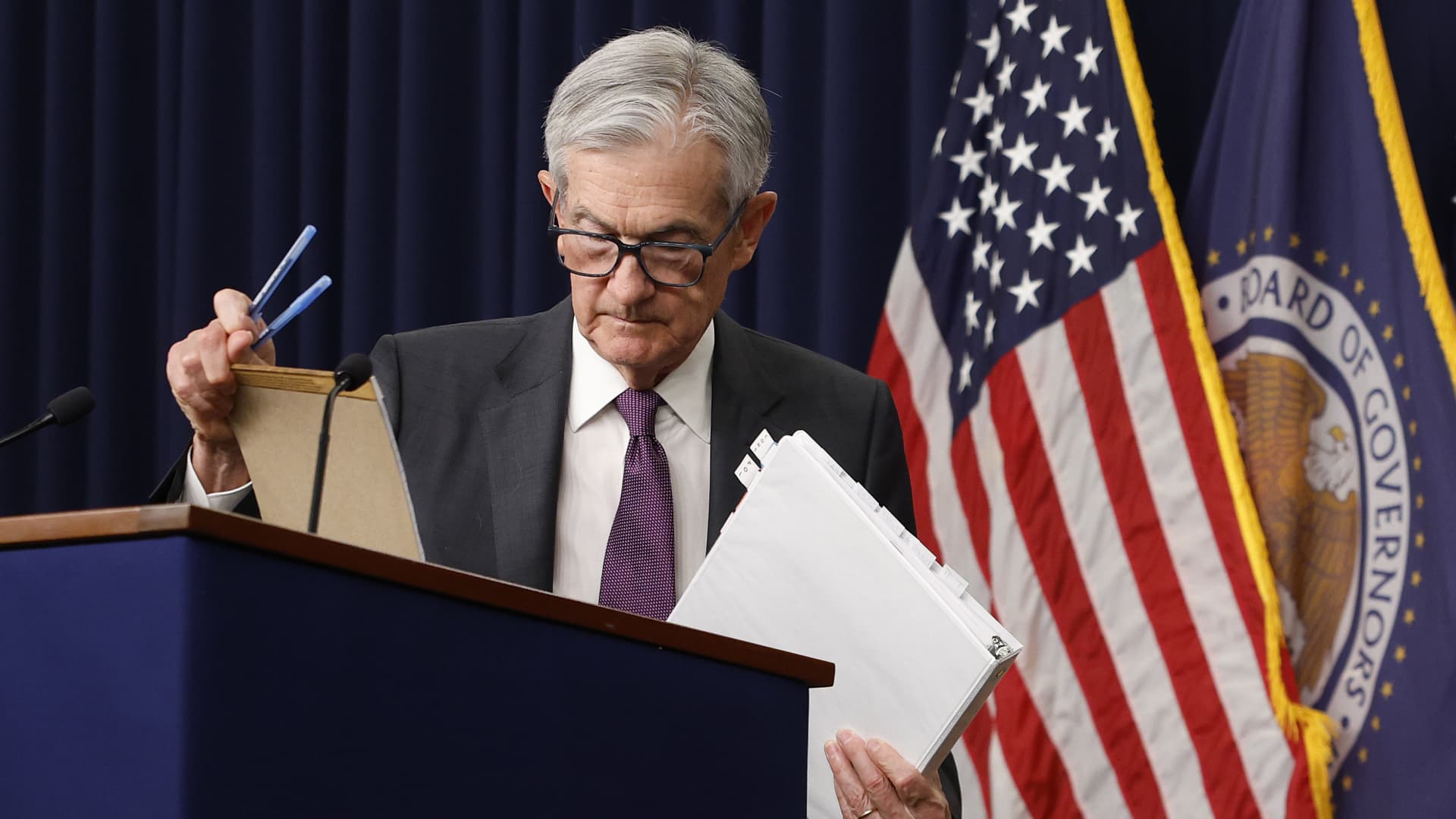Federal Reserve Chair Jerome Powell expressed concern in a speech Wednesday that the central bank could find itself in a dilemma between controlling inflation and supporting economic growth.
With uncertainty elevated over what impact President Donald Trump’s tariffs will have, the central bank leader said that while he expects higher inflation and lower growth, it’s unclear where the Fed will need to devote greater focus.
“We may find ourselves in the challenging scenario in which our dual-mandate goals are in tension,” Powell said in prepared remarks before the Economic Club of Chicago. “If that were to occur, we would consider how far the economy is from each goal, and the potentially different time horizons over which those respective gaps would be anticipated to close.”
The Fed is tasked with ensuring stable prices and full employment, and economists including those at the Fed see threats to both from the levies. Tariffs essentially act as a tax on imports, though their direct link to inflation historically has been spotty.
In a question-and-answer session after his speech, Powell said tariffs are “likely to move us further away from our goals … probably for the balance of this year.”
Powell gave no indication on where he sees interest rates headed, but noted that, “For the time being, we are well positioned to wait for greater clarity before considering any adjustments to our policy stance.”
Stocks hit session lows as Powell spoke while Treasury yields turned lower.
In the case of higher inflation, the Fed would keep interest rates steady or even increase them to dampen demand. In the case of slower growth, the Fed might be persuaded to lower interest rates. Powell emphasized the importance to keeping inflation expectations in check.
Markets expect the Fed to start reducing rates again in June and to enact three or four quarter-percentage-point cuts by the end of 2025, according to the CME Group’s FedWatch gauge.
Fed officials generally consider tariffs to be a one-time hit to prices, but the expansive nature of the Trump duties could alter that trend.
Powell noted that survey- and market-based measures of near-term inflation are on the rise, though the longer-term outlook remains close to the Fed’s 2% goal. The Fed’s key inflation measure is expected to show a rate of 2.6% for March, he said.
“Tariffs are highly likely to generate at least a temporary rise in inflation,” said Powell. “The inflationary effects could also be more persistent. Avoiding that outcome will depend on the size of the effects, on how long it takes for them to pass through fully to prices, and, ultimately, on keeping longer-term inflation expectations well anchored.”
The speech was largely similar to one he delivered earlier this month in Virginia, and in some passages verbatim.
Powell noted the threats to growth as well as inflation.
Gross domestic product for the first quarter, which will be reported later this month, is expected to show little growth in the U.S. economy for the January-through-March period.
Indeed, Powell noted “The data in hand so far suggest that growth has slowed in the first quarter from last year’s solid pace. Despite strong motor vehicle sales, overall consumer spending appears to have grown modestly. In addition, strong imports during the first quarter, reflecting attempts by businesses to get ahead of potential tariffs, are expected to weigh on GDP growth.”
Earlier in the day, the Commerce Department reported that retail sales increased a better-than-expected 1.4% in March. The report showed that a large portion of the growth came from car buyers looking to make purchases ahead of the tariffs, though multiple other sectors showed solid gains as well.
Following the report, the Atlanta Fed said it sees GDP growing at a -0.1% pace in Q1 when adjusting for an unusual rise in gold imports and exports. Powell described the economy as being in a “solid position” even with the expected slowdown in growth.
Get Your Ticket to Pro LIVE
Join us at the New York Stock Exchange!
Uncertain markets? Gain an edge with CNBC Pro LIVE, an exclusive, inaugural event at the historic New York Stock Exchange.
In today’s dynamic financial landscape, access to expert insights is paramount. As a CNBC Pro subscriber, we invite you to join us for our first exclusive, in-person CNBC Pro LIVE event at the iconic NYSE on Thursday, June 12.
Join interactive Pro clinics led by our Pros Carter Worth, Dan Niles, and Dan Ives, with a special edition of Pro Talks with Tom Lee. You’ll also get the opportunity to network with CNBC experts, talent and other Pro subscribers during an exciting cocktail hour on the legendary trading floor. Tickets are limited!

 Blog Post6 days ago
Blog Post6 days ago
 Accounting1 week ago
Accounting1 week ago
 Economics1 week ago
Economics1 week ago
 Personal Finance1 week ago
Personal Finance1 week ago
 Economics1 week ago
Economics1 week ago
 Personal Finance1 week ago
Personal Finance1 week ago
 Accounting1 week ago
Accounting1 week ago
 Finance1 week ago
Finance1 week ago









